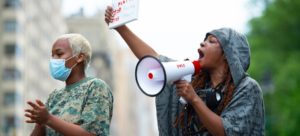A new report outlines more than 60 recommendations that researchers say could help the city of Los Angeles atone for the “deep and profound” impact its policies have had on Black Angelenos over decades, hindering their access to housing, jobs, and healthcare.
The recommendations — from a study led by L.A.’s Reparations Advisory Commission — are organized into a dozen categories, including racial terror, housing segregation, and political disenfranchisement.
They urge the city to:
- Enact a resolution affirming the rights of descendants of enslaved people;
- Address the historical legacy of anti-Black policing in the city of Los Angeles through anti-racist policies and compensatory initiatives;
- Rectify pay and employment inequities and wage loss;
- Reinforce legislation that protects against housing discrimination, and
- Protect civil and voting rights of disenfranchised communities.
Researchers say the information contained in the report could eventually be used to implement policies on reparations.
Support for LAist comes from
“While not all harms can be remedied by the City of Los Angeles, it is imperative that the City take proactive steps to begin addressing the systematic injustices plaguing the Black population” the report reads.
Details of the study
The 386-page final report — titled “An Examination of African American Experiences in Los Angeles” — was released this week and follows a preliminary report released late last year. Prepared by researchers at California State University Northridge, its aim was to document various types of harm to the city’s Black population since L.A. was chartered in 1925.
Researchers collected data through surveys, focus groups and interviews, and provided historical context from previous studies.
The researchers noted that while other agencies and institutions, both public and private, contributed to the harm experienced by Black Angelenos over time, the latest study focused on L.A.’s role in marginalizing its Black residents.
Capri Maddox, executive director of the city’s Civil + Human Rights and Equity Department, said it’s important to be “intentional” when looking at harms that have affected Black Angelenos for generations.
Support for LAist comes from
“African Americans are still three times more likely to be killed by law enforcement than their white counterparts,” Maddox told LAist’s Austin Cross. “I think it’s important to also think about the planning aspects… when you think about the Planning Department and how we can maybe build communities where we don’t have as many food deserts or food swamps.”
Maddox pointed to the history of redlining in the Los Angeles area, a racist practice in which banks and insurance companies would not do business with African Americans and other people of color.
“This came up recently with the fires… ,” she said. “African Americans were welcome in Altadena (an unincorporated part of L.A. County), and that is why you had so many African Americans impacted by those fires.”
The Civil Rights Department established its Reparations Advisory Commission in June 2021, about a year after people across the country marched in protest against racial injustice and police violence after the murder of George Floyd in Minneapolis.
Commissioners launched the study in 2023, not only to document the Black experience in L.A. but to research how harm could be calculated or quantified. Along with Cal State Northridge, the L.A.-based nonprofit research consulting firm, Mockingbird Analytics, worked on the project, researchers said.
The commission’s effort isn’t the only one centered on the discussion of reparations for Black Americans. In January, reparations advocates campaigned at the state Capitol to drum up support for two bills that stalled last year.
Also last year, the California Legislative Black Caucus supported a 14-bill reparations package, parts of which would have created a new state agency, and a fund for reparations policies.
Support for LAist comes from
As reported by CalMatters, the caucus later sought a less sweeping approach in the face of public backlash and prevented the proposals from coming to a vote in the Assembly, which upset advocates.
Gov. Gavin Newsom signed five of the 14 bills.
Findings
The final report makes some general recommendations, but the bulk are grouped into 12 major categories.
They are:
- Vestiges of slavery
- Racial terror
- Mental/physical harm and neglect
- Racism in environment and infrastructure
- Unjust legal system
- Housing segregation
- Stolen labor and hindered opportunity
- Separate and unequal education
- Political disenfranchisement
- Pathologizing the Black family
- Control over creative cultural and intellectual life
- The wealth gap
Key takeaways
- In Los Angeles, government-sponsored subjugation led to a widespread culture of oppression, according to the report. As one example, the report notes that during the 1850s, official Los Angeles City maps included racist street names.
- Respondents said restoring the assets of and preserving history within Black communities was “extremely appropriate” for reparations efforts. Most respondents — 72% — said classified preservation of Black communities as “favorable” and 74% “highly endorsed” asset restoration.
- More than 80% of respondents said they want culturally affirming healthcare training programs and education support.
- The category of addressing law enforcement injustices received the highest buy-in from respondents, according to the report, with 58.3% rating it as “most appropriate” and another 14.1% picking “very appropriate” — for a combined total of 72.4%.
- 80.6% of respondents favored protections for home appraisals when surveyed.
What’s next?
After taking input from a public forum held last Saturday, L.A.’s Reparations Advisory Commission is expected to develop its own recommendations based on the study for the City Council to consider.
Support for LAist comes from
Editor’s note: Capri Maddox sits on the Board of Trustees for Southern California Public Radio, which publishes LAist.com.
Source: https://laist.com/news/politics/reparations-study-los-angeles-black-communities




